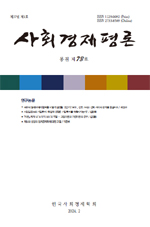마르크스는 『자본』에서 고정자본(기계)의 경제적 감가와 가변자본(노동력 상품)의 가치 결정을 묘사하기 위해 ‘도덕’이라는 개념을 도입하였다. 우리는 이 글에서 마르크스 체계에서 도덕적 요소가 갖는 이론적 역할을 규명하였다. 자본주의 생산양식은 끊임없이 재생산의 규칙이 변경되는 게임에 해당하는데 이러한 수정된 규칙에 경제 주체들은 지속적으로 순응하여야 한다. 생산 및 소비 규범의 항구적 변화에 대한 경제 주체들의 적응 과정을 분석하기 위해 마르크스는 도덕이라는 개념을 사용하였다.
To describe the obsolescence of fixed capital and change of labor power value, Marx introduces the concept of ‘moral’ in Capital. This paper tries to investigate the theoretical role of the moral elements in the whole system of Marxian economics. Owing to technological progress and class struggles, capitalist mode of production becomes to be a kind of game which rules of reproduction should be ceaselessly altered. The permanent changes in production/consumption norms forces economic agents like, capitalists to adapt to everchanging standards. One can conjecture that Marx adopts the ‘moral’ concept to analyse this process.
Ⅰ. 서론: 두 개의 도덕
Ⅱ. 도덕적 감가
Ⅲ. 노동력 가치의 도덕적 요소: 가변자본의 경우
Ⅳ. 항구적 규범 변동 체계: 자본주의적 도덕의 일반이론
Ⅴ. ‘마음과 정신’의 문제
Ⅵ. 최종심급으로서의 계급투쟁
Ⅶ. 맺음: 자본주의의 내재적 모순 재론
참고문헌
